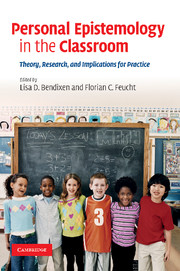Book contents
- Frontmatter
- Contents
- List of figures
- List of tables
- Contributors
- Part I Introduction
- Part II Frameworks and conceptual issues
- Part III Students' personal epistemology, its development, and its relation to learning
- Part IV Teachers' personal epistemology and its impact on classroom teaching
- 13 Epistemological resources and framing: a cognitive framework for helping teachers interpret and respond to their students' epistemologies
- 14 The effects of teachers' beliefs on elementary students' beliefs, motivation, and achievement in mathematics
- 15 Teachers' articulation of beliefs about teaching knowledge: conceptualizing a belief framework
- 16 Beyond epistemology: assessing teachers' epistemological and ontological worldviews
- Part V Conclusion
- Index
14 - The effects of teachers' beliefs on elementary students' beliefs, motivation, and achievement in mathematics
Published online by Cambridge University Press: 04 May 2010
- Frontmatter
- Contents
- List of figures
- List of tables
- Contributors
- Part I Introduction
- Part II Frameworks and conceptual issues
- Part III Students' personal epistemology, its development, and its relation to learning
- Part IV Teachers' personal epistemology and its impact on classroom teaching
- 13 Epistemological resources and framing: a cognitive framework for helping teachers interpret and respond to their students' epistemologies
- 14 The effects of teachers' beliefs on elementary students' beliefs, motivation, and achievement in mathematics
- 15 Teachers' articulation of beliefs about teaching knowledge: conceptualizing a belief framework
- 16 Beyond epistemology: assessing teachers' epistemological and ontological worldviews
- Part V Conclusion
- Index
Summary
Introduction
According to Pajares (1992), teachers’ beliefs can be deeply personal, unaffected by persuasion, and either implicitly or explicitly expressed in daily routines. Their beliefs can be formed by chance, an intense experience or a succession of events, and may include beliefs about different facets of teaching and learning. Teachers hold beliefs about students, learning, teachers and teaching, the nature of knowledge and knowing, the roles of schools in society, and the curriculum, to name a few (Levitt, 2001). Whatever their origin or object, research has shown that beliefs influence a wide variety of cognitive processes including memory, comprehension, deduction and induction, problem representation, and problem solution (Pintrich, 1990). Importantly, the study of teachers’ beliefs provides a valuable means of analyzing and understanding the complex relationship between beliefs and student outcomes (Hofer and Pintrich, 2002; Pajares, 1992; Schraw and Olafson, 2002).
In his review of research on teachers’ beliefs, Pajares (1992) reported that teachers’ beliefs about teaching and learning, including beliefs about students, significantly influence teachers’ classroom practices. Moreover, he found that teachers’ beliefs are more likely to influence the types of instructional strategies they implement in the classroom than their knowledge about a particular content area or instructional strategies. As Peterman (1993) and Tobin (1993) observed, the primary way in which teachers’ educational beliefs are given meaning is through their expression in the classroom.
- Type
- Chapter
- Information
- Personal Epistemology in the ClassroomTheory, Research, and Implications for Practice, pp. 435 - 469Publisher: Cambridge University PressPrint publication year: 2010
- 23
- Cited by



